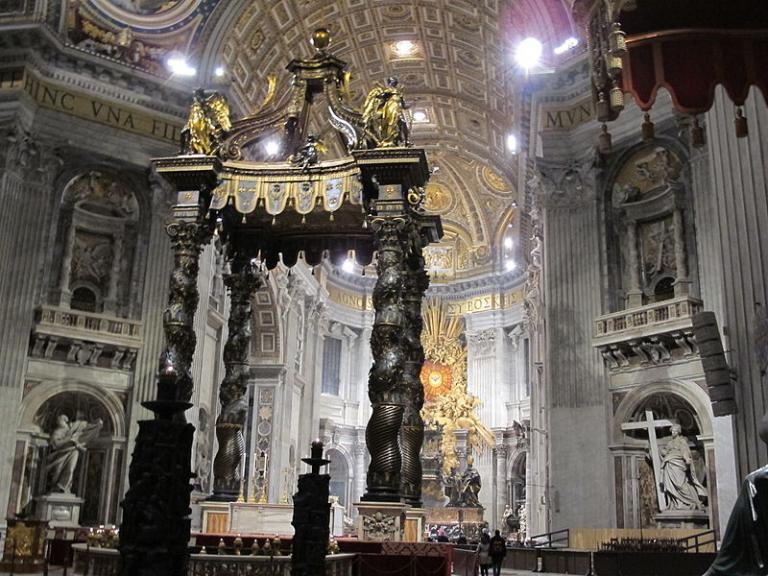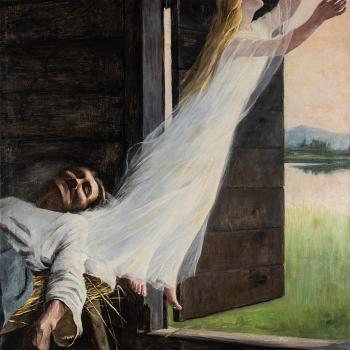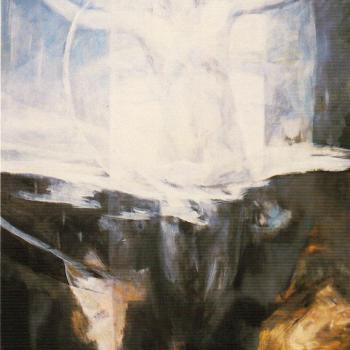
(Wikimedia Commons public domain image by “Sailko”)
His death has received (to me) surprisingly little coverage, probably because he was no longer the reigning pope and because he had gone into fairly complete seclusion since resigning the papacy nearly a decade ago. Those are, of course, very much the reasons why his funeral — although it will take place in St. Peter’s Basilica and although the currently reigning Bishop of Rome, Pope Francis, will preside over it (which is, to put it mildly, a rarity) — will be a rather small one. But Pope Benedict XVI was a consequential Catholic thinker and leader even apart from his tenure as the Supreme Pontiff. Here, to help to illustrate that fact, are two groups of short appreciations of him by a number of prominent Catholic writers (including Robert Royal, a historian whose work I’ve enjoyed, and Anthony Esolen, who is currently my favorite translator of Dante):
The Catholic Thing: “Benedict XVI: A Tribute”
The National Catholic Register: “Benedict’s Books: Unpacking the Late Pope’s Theological Impact: Six prominent theologians illustrate Benedict XVI’s great contributions to the life and mind of the Church by reflecting upon some of his most significant theological works”

On Saturday last, when I heard the news of the passing of Pope Benedict, I posted a few sentiments and a memory about him here on this blog. (See “The Passing of a Pope, and of a Year.”) Shortly thereafter, voices at the Peterson Obsession Board began to express their indignation at what I had written, pronouncing it a “slam” against the former leader of the world’s Catholics. The parade example? After referring to the late pope multiple times under his regnal title of Pope Benedict XVI (or some variant thereof), I had closed my blog entry with this statement: “I firmly believe [that] Joseph Ratzinger has now entered into a new life after decades of attempting to serve God in the best way he could. Requiescat in pace.” How arrogant! I had insulted him as having merely attempted to serve God. And I had “disparaged” Catholicism. For example, my use of the late Pope Benedict’s name Joseph Ratzinger was allegedly “disrespectful in the extreme,” discourteous, “mean spirited,” “lacking simple decency,” “hypocritical,” and “incredibly offensive.”
Well, I think that I’ll briefly respond. (You can read or re-read my previous blog entry yourself in order to judge whether it is fairly characterized as a “slam” that was “incredibly offensive,” “lacking simple decency,” “hypocritical,” “mean spirited,” discourteous, and “disrespectful in the extreme.”)
I absolutely do not believe that Pope Benedict XVI would have been even slightly outraged at my summarizing his mortal life as “decades of attempting to serve God in the best way he could.” Anybody who has read what he wrote (or glanced through the links that I supplied on Saturday) would recognize that characterization as nothing more nor less than his very own, very modest self-understanding. (See, too, “Former Pope Benedict XVI asks for forgiveness, thanks God in final published letter.”) Moreover, my personal view of our universal human condition is that “attempting to serve God in the best way we can” is the best that any of us can hope to achieve here in mortality. My description of Pope Benedict as having done so was intended to praise him, not to denigrate him.
And as for the use of his pre-papal name, Joseph Ratzinger, please read through the tributes to which I’ve linked above and notice how frequently that name is used by devout, conservative Catholics to refer to him, along with his regnal title of Benedict XVI. When I wrote my final line, thinking of Pope Benedict’s entry into eternity, I had in mind not only the fact that, when we die, we probably don’t carry many of our earthly titles (e.g., Doctor, Professor, President, Senator, Congresswoman, or Mayor) with us into the next world, where they’re irrelevant and count for nothing, but also a very specific ritual that has been connected with the death of popes for centuries now. It originated in a world where confirming death was a bit more uncertain than today’s medical technology allows:
When a pope is thought to have died, the papal chamberlain (who assumes temporary stewardship of the Vatican after a pontiff’s death) takes a silver hammer expressly made for the occasion and taps the pope’s head three times, all the while calling out the pope’s baptismal name with each tap. Whether this was actually done in the case of the no-longer-reigning Pope Benedict XVI, I currently have no idea. (It’s a situation without traditional precedent.) But it means that, in the case of Pope Benedict, the chamberlain would not have called out his regnal name, Benedict, after each tap of the hammer but, rather, his given baptismal name of Joseph (or perhaps, depending upon the nationality of the chamberlain, Giuseppe). At that moment of transition into the world to come, Pope Benedict XVI would have been, simply, Joseph Aloisius Ratzinger. If the pope does not respond to the three taps, the chamberlain then turns to the others in the room and ceremonially declares, “The pope is truly dead.” Thereupon, he immediately falls to his knees and prays Psalm 130, the De Profundis, which is a penitential psalm.
I note, too, just as an interesting but supportive detail, that there is, so far as I can recall, only one pope who is explicitly identified in the early-fourteenth-century Paradiso of Dante Alighieri as residing in heaven. It is John XXI, who briefly occupied the papacy from 8 September 1276 to his death on 20 May 1277, the only physician and the only Portuguese ever to have held the office. But does Dante, that great and devout late-medieval Catholic poet, refer to him as Pope John XXI? No. He does not. Instead, he refers to him as Pietro Ispano or Pietro Spano (“Peter of Spain”). Pope John XXI, you see, was born as Pedro Julião in what is now Portugal, and was widely known before (and, clearly, after) his pontificate as Petrus Hispanus in Latin and, in Portuguese, as Pedro Hispano. I don’t believe that anybody on the Peterson Obsession Board can plausibly argue that Dante intended to be “disrespectful,” discourteous, “mean spirited,” without “simple decency,” “hypocritical,” or “incredibly offensive” when he singled “Peter of Spain” out as being in Paradise.















